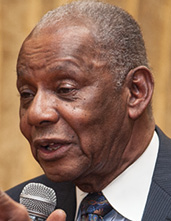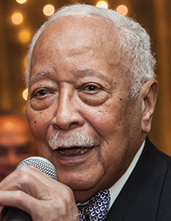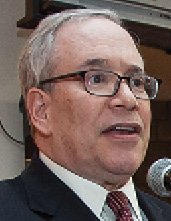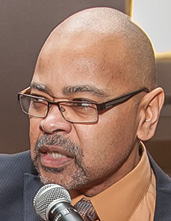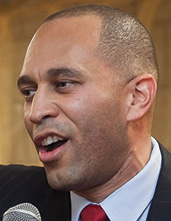Public Employee Press
37th annual Black History Month celebration, Feb. 1-12
Labor’s Black History Makers

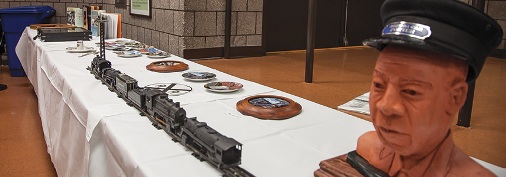
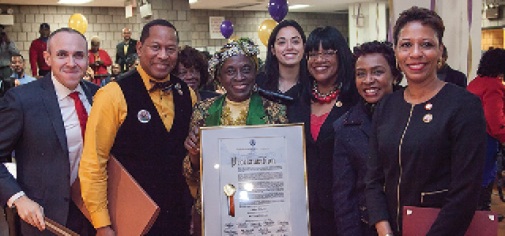
BLACK HISTORY MONTH began with a ribbon-cutting and opening night dedicated to “The African-American Experience in the Labor Movement.”
“We chose to honor our First Lady of Labor, Lillian Roberts, who has devoted more than 60 years to the labor movement. No other person alive today embodies our theme this year as Lillian Roberts does,” said Deborah Pitts, the Black History Committee chair who is the union’s secretary and president of Local 1113. “As an organizer and union leader, Lillian broke through glass ceilings and brick walls to build our mighty union, empowering women and including working families’ needs in labor’s fight for dignity and fair wages.”
Throughout February locals honored extraordinary labor leaders past and present, including Ms. Roberts, retired AFSCME Secretary-Treasurer William Lucy, organizer A. Phillip Randolph, Memphis sanitation workers Echol Cole and Robert Walker, whose untimely deaths sparked the I Am a Man campaign and workers’ strike for which Dr. Martin Luther King Jr. died, and C. Carter Woodson, Negro History Week founder. Events focused on the challenges unions face, the Feb. 24 Day of Action for Janus v. AFSCME, and the historic intersection of the civil rights and labor movements.
The union, its BHM committee with co-sponsor Local 372, celebrated Ms. Roberts’ 90th birthday with special guests former NYC Mayor David Dinkins, AFSCME President Lee Saunders, state AFL-CIO leader Terry Melvin, Comptroller Scott Stringer, Public Advocate Letitia James, local labor leaders, members of the City Council and state legislature, and nearly 400 union members and retirees.
“Like Dr. King, Lillian Roberts dedicated her life to workers and to this movement,” said Saunders. “Lillian sees the glass half full no matter the challenge. She understands the risks that come with standing up for workers’ rights, for union rights and for economic rights—whether in her early days in Chicago or as we march on Foley Square February 24.”
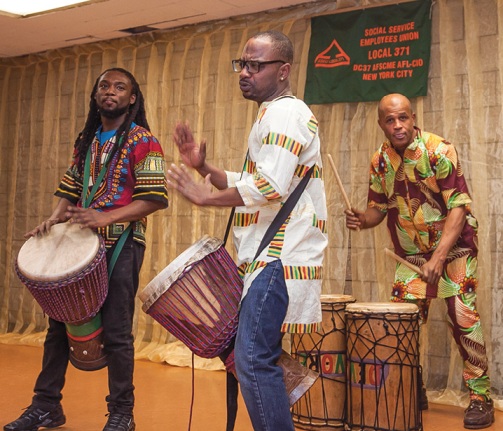
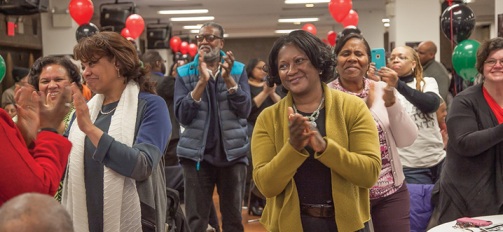
“She finds a way to educate, organize and mobilize workers to make our voices heard every day,” Saunders said. “We come together and raise our voices because we are AFSCME and we aren’t taking it anymore! Lillian Roberts is a rich part of labor history in America.”
On Feb. 2 Local 2627’s Cody Childs and his band entertained over 100 members with legendary singer/ songwriter Sam Cooke’s timeless hits “You Send Me,” Twistin’ the Night Away,” “Chain Gang,” and civil rights anthem “A Change is Gonna Come,” a B-side of his last major hit, “Shake.”
On Feb. 8, the Political Action Committee celebrated A. Phillip Randolph, who led the 10-year struggle to establish the Brotherhood of Sleeping Car Porters. “You get what you can take, and you keep what you can hold. If you can’t take anything, you won’t get anything, and if you can’t hold anything, you won’t keep anything,” said Local 768 President Fitz Reid, quoting Randolph.
Reid said Randolph’s “organizing a union of porters in 1935 was a major victory for black workers.” Randolph also chaired the 1963 March on Washington and served on AFL-CIO’s executive council. On Feb. 5 Local 1930 showed the Randolph biopic 10,000 Black Men Named George.
“Tonight we learn history from people who made history,” said President Anthony Wells, who is a DC 37 and AFSCME International vice president. On Feb. 9, Social Services Employees Union Local 371 was “Reclaiming Our Time,” with labor giant William Lucy, the former secretary-treasurer of AFSCME; Homemakers Mary Highsmith and Bobbie Willis, who went on strike for better wages and dignity for welfare recipients in 1965, and U.S. Rep. Hakeem Jeffries of Brooklyn, whose House floor rebukes of 45 are youtube.com must-sees. “How dare you lecture us about treason,” Jeffries said of Trump. “This is not a dictatorship. This is a democracy and we do not have to stand for a reality show host masquerading as President of the United States.”
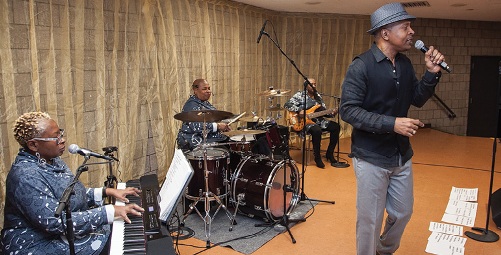
Sam Cooke’s music on Feb. 2 for Local 2627.
“That drew Dr. King into the fight; he was in the midst of his Poor People’s campaign,” Lucy recalled. “Dr. King joined us in a battle whose time had come. We organized for change and fought for fair treatment, respect and decent wages. We believed if we worked together, labor and electeds, we could make America live up to its ideals, improve workers’ lives, live up to what’s promised on paper.”
Lucy also recounted how with Harry Belafonte and Randolph Robinson, he led the international campaign to break South Africa’s apartheid system and free Nelson Mandela. Lucy said, “To see Mandela walk out of prison into freedom that Sunday morning was one of the greatest moments of my life.”
AFSCME
Former NYC Mayor
Public Advocate
City Comptroller
NYS AFL-CIO
U.S. Representative
U.S. Representative
At “Our Fight, Our Future,” Local 1407’s event Feb. 12, DC 37 Executive Director Henry Garrido called out Trump’s budget proposal as “hundreds of pages of bad policy,” with deep cuts to public housing, labor protections and more.
“We celebrate because we built this country for free,” said Leroy Gasden, president of the Jamaica Branch NAACP, referring to slave labor. African-Americans overcame centuries of oppression and their contributions grew the US into a global world power. “We were more than slaves,” Gasden said. “We were survivors.”



